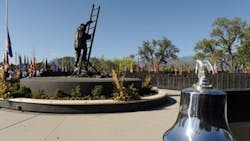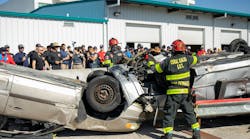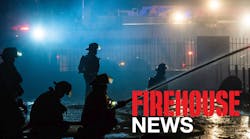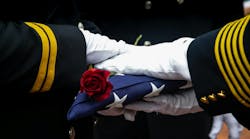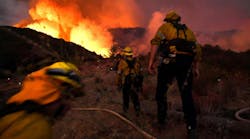Sept. 16 -- Sixteen years after the 343 New York City firefighters who died in the collapse of the twin towers on 9/11 were honored at an annual ceremony in Colorado Springs, another wave of victims of the terrorist attack is being added to the memorial wall.
Nineteen of the 271 union firefighters whose names were read out at this year’s Fallen Fire Fighter Memorial on Saturday in Memorial Park died of illnesses or conditions associated with the aftermath of the attack when firefighters were called upon to dig through the toxic rubble at what came to be known as ground zero, at first hoping to rescue survivors, then hoping to at least find remains.
The numbers are only expected to increase. A New York Fire Department study found that more than 9,000 firefighters were exposed to 9/11 dust that put them at higher risk of cancer and respiratory, heart and autoimmune diseases. Thousands more are suffering from post-traumatic stress disorder.
For Eric Bischoff, the Sept. 11 attacks have been a never-ending tragedy. Six of the Staten Island firefighter’s crew died in the attack on Sept. 11, 2001. His neighbors lost fathers, mothers, brothers, sisters, sons, daughters and other loved ones.Even after the smoke obscuring Manhattan lifted and the debris was clear, the aftermath of the attacks continued to take a deadly toll on the emergency responders and construction workers removing the wreckage.
“There’s the saying, ‘All gave some, and some gave all,’ and that’s true with 9/11,” said Bischoff, who serves as the Uniformed Firefighters Association’s Staten Island Trustee. “Everyone there got a piece of something harmful.”
The U.S. Environmental Protection Agency eventually identified 287 chemicals in the dust from the building materials and contents as well as the jet fuel and gasoline.
Officials foresaw the toxic cocktail would affect firefighters in years to come.
“Now, as the years trickle in, just as we predicted, we’re noticing a spike in 9/11-related cancers and illnesses,” Bischoff said. “Guys started to get sick at rates that were off-the-charts higher than the general population.”
The cancer rate among FDNY firefighters exposed to the chemicals from the World Trade Center was about 19 percent higher than those not exposed, according to a study published by the FDNY World Trade Center Health Program in 2016.
Bischoff estimated that around 50 to 60 died of ground zero-related illnesses in the first 10 years after the attack, with more than 100 dying in the seven years since 2011.
Of the 16,941 FDNY who are enrolled in the World Trade Center Health Program — which provides medical benefits to those affected by the 9/11 attacks under the James Zadroga 9/11 Health and Compensation Act — 7,900 received treatment between April 1, 2017, and March 31, according to the Centers for Disease Control and Prevention.
More than 5,000 had diagnostic evaluations and 9,837 had monitoring or screening exams.
Officials are also seeing unexpected forms of illnesses, such as prostate or breast cancers.
Retired FDNY firefighter Jimmy Martinez, for example, died Aug. 23 from a bone marrow cancer caused by the toxins at ground zero, the New York Daily News reported. Martinez’s name as well as the other union firefighters who died of World Trade Center-related illnesses in 2018 will be added during next year’s ceremony.
The International Association of Fire Fighters union was instrumental in negotiating the Zadroga Act and continues to lobby for the health care program to cover cancers that previously had not afflicted 9/11 responders. The advocacy is central to the IAFF’s mission, whether 9/11-related or not.
Twelve of those whose names were added for Saturday’s service died of traumatic injuries, two of post-traumatic stress disorder and 192 of work-related cancers.
“Each name has a story,” said IAFF General President Harold Schaitberger, “a story of bravery, of the vigor of a great profession that we’ve dedicated our lives to.
“It’s important to know that we won’t quit our efforts to improve death benefits and workers’ compensation that our firefighters deserve.”
___ (c)2018 The Gazette (Colorado Springs, Colo.) Visit The Gazette (Colorado Springs, Colo.) at www.gazette.com Distributed by Tribune Content Agency, LLC.
